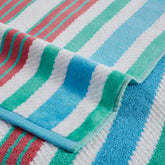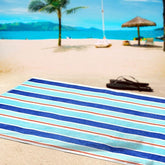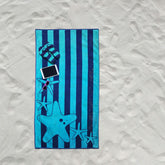How do you decide between a comforter and a duvet? Let us compare the two to help you decide which one is best for you.
What Is a Duvet?
A duvet is a lightweight, flat cover consisting of down, feathers, wool, or man-made filling and enclosed in a light cloth. It's supposed to be combined with a unique duvet cover that serves both as protection and decoration. Because of its effectiveness and cleanliness, this European technique is gaining popularity all over the world.
One of the most significant advantages of a duvet is its adaptability. By just changing the duvet cover, you may change the look of your bedding, which is perfect for seasonally changing your design. Because the cover can be washed frequently without requiring the large insert to be cleaned every time, it's also healthier.
Quick facts about duvets:
-
Comfort and warmth are dictated by the best duvet inserts.
-
There are countless hues and designs available for duvet coverings.
-
Washing just the cover makes it easier to keep clean.
The fact that duvets make your bed feel lighter and more airy is yet another fantastic benefit. Duvets provide the same warmth as heavy comforters but without the oppressive weight that sometimes is too much for the body. Because of this, they are especially popular with warm sleepers or those who live in milder climes.
Pro Tip: If you want to buy the best duvet inserts, be sure to verify the fill power. Greater insulation with less weight is possible with higher fill power (over 600), which can also enhance the quality of your sleep.
Duvet-Related Frequently Asked Questions (FAQs)
- What are the advantages of using a duvet rather than a comforter?
More customization and upkeep options are available with a duvet system; you may wash each cover separately or switch out the covers.
-
Can you machine wash duvet inserts?
Most are, although synthetic inserts may usually be machine washed, whereas down inserts usually require extra care or dry cleaning.
-
How can I stop the duvet insert from shifting within the cover?
To hold everything in place, look for coverings with internal straps and inserts with corner loops.
-
What kind of filling ought I to use for my duvet insert?
Down: Warm, airy, and light.
Wool: Naturally wicks away moisture and regulates temperature.
Microfiber: low maintenance, low cost, and hypoallergenic.
-
Are duvets appropriate for all types of climates?
Indeed. Without changing the duvet cover, use a thick insert in the winter and a light one in the summer.
Bonus Tip: Use a duvet insert made of synthetic down alternatives if you have allergies. They offer the same level of softness as genuine down without making people more sensitive.
Describe a comforter:
A comforter is a thick blanket with quilting that is stuffed with feathers, down, or synthetic fibers. Unlike a duvet, a comforter is ready to use straight out of the box and doesn't require a cover. To keep the fill properly distributed, prevent cold spots, and maintain a tidy, fluffy appearance, it is quilted or sewn in place.
Bedding essentials offered in bedding sets with matching bed skirts, shams, and comforters make it simple to coordinate your entire bed at once. Because of this, they are ideal for anyone who appreciates ease of use and a professional, unified appearance.
Favorite features of comforters include
-
No more coverings are required.
-
With designer sets, you may instantly upgrade your room's appearance.
-
Luxurious fabrics are available, such as silk or Egyptian cotton.
The thickness and softness that so many comforters offer is another alluring characteristic. For cold winter nights or anyone who enjoys the sensation of being encased while sleeping, a well-padded comforter may make sleeping feel like being in a warm, cozy cocoon.
Cleaning a comforter, however, can be a little more difficult if the cover isn't detachable. It takes time and occasionally calls for expert cleaning services to launder the entire blanket, particularly for expensive comforters. Additionally, purchasing a completely new comforter is frequently necessary when upgrading the décor of your bedroom, which can mount up over time.
Considerations when purchasing a comforter:
-
Make sure it fits your mattress correctly; size counts.
-
Verify the stitching type (box stitching prevents fill from bunching).
-
If you like simple maintenance, look for machine-washing capabilities.
Commonly Asked Questions (FAQs) Concerning Comforters
-
Which benefit of utilizing a comforter is the biggest?
ease of use. There is no need for covers or inserts; just place it on your bed, and it is ready to use.
-
How often is it necessary to wash a comforter?
Every three to six months is ideal. Large-capacity machines or expert cleaners may be required for heavy or expensive comforters.
-
Is it possible to use comforters all year round?
Some are marketed as "all-season," but depending on the weight and fill, you can find them too light for harsh winters or too hot in the summer.
-
Do comforters cause allergies?
Indeed. Hypoallergenic down alternatives are now used in comforters to accommodate sensitive sleepers.
-
Are comforters prone to losing their shape with time?
Yes, they can. They stay soft and in form with frequent fluffing and mild cleaning.
Another piece of advice is to always place a top sheet between you and the comforter.
Duvet vs. Comforter: Which One Is Right for Your Lifestyle?
While duvets and comforters share the crucial role of keeping you warm and looking great, they provide two different experiences.
-
Duvets are ideal for individuals seeking utmost flexibility. You can simply refresh the appearance of your bedroom by replacing the duvet cover, washing the cover frequently for freshness, and adjusting to seasonal temperature fluctuations by simply replacing the insert.
-
Comforters, on the other hand, are appropriate for people who appreciate ease of use and quick satisfaction. You have a finished, coordinated look right away; there is no need to fiddle with covers or inserts. A comforter might be a better option for you if you like the feel of a thick, cozy blanket and don't want to do much upkeep.
-
Comforters are a good choice for people who prefer ease of use and instant satisfaction. Without fumbling with covers or inserts, you instantly have a polished, well-coordinated look. A comforter might be a better option for you if you prefer the feel of a thick, cozy blanket and don't want to do much upkeep.
This is a quick decision guide:
-
If you like a duvet's changeable warmth, ease of cleaning, and frequent style upgrades, go for it.
-
Choose a comforter if you prefer a unique installation and consistent bed styles and if you don't mind less frequent but more intense cleaning.
-
These days, both have high-end equivalents, such as a goose-down duvet insert with a silk cover or an Egyptian cotton comforter with a high thread count. Ultimately, your decision should be based on what supports your lifestyle and improves your level of comfort.
Lastly, which one should I choose?
The decision truly rests with you, taking into account your needs, way of life, and level of effort to maintain your bedding.
Use a duvet if:
-
You like easily changing the look of your bedroom.
-
You like to wash more frequently and in a simpler way.
-
Changing inserts allows you to have seasonal flexibility.
If: Choose a comforter
-
You like a simple, one-step solution.
-
Your bedroom's comfort and style can be significantly improved by both duvets and comforters.
-
Whether you like the pre-made luxury of a comforter or the versatile elegance of a duvet, investing in either will help create a more cozy and peaceful haven.
-
You like your bed to be styled consistently and without extra components.
-
Professional cleaning when required is something you don't care about.
Your lifestyle, personal preferences, and level of maintenance tolerance will ultimately determine whether you choose a comforter or a duvet. A comforter can be a better alternative if you want something that is ready to use and requires little upkeep.







